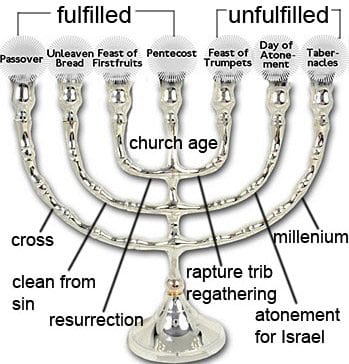The First of Tishri on the Hebrew calendar, which begins the Jewish New Year, is the celebration of Rosh Hashana ("The Head of the Year") and also the Feast of Trumpets. This day begins Israel's civil year and is celebrated for two days (the second day was added by the rabbis around 500 b.c.).
Everything in the Torah (or the Pentateuch, the Five Books of Moses) has a prophetic as well as historical significance and merits our careful attention. Jesus indicated this in Matthew 5:17:
Think not that I am come to destroy the Torah, or the prophets: I am not come to destroy, but to fulfill.
Paul also emphasized this in Romans 15:4:
For whatsoever things were written aforetime were written for our learning. . .
The New Testament is in the Old Testament concealed; the Old Testament is in the New Testament revealed.
The Feasts of Moses
The Torah details seven feasts which take place during the Hebrew calendar year:1
Three feasts are in the spring, in the month of Nisan: Passover; the Feast of Unleavened Bread; and the Feast of First Fruits. Fifty days later there is a fourth feast, Shavout, or the Feast of Weeks, also known as Pentecost.
There are three remaining feasts in the fall, in the month of Tishri: the Feast of Trumpets; the Yom Kippur(the Day of Atonement); and the Feast of Tabernacles. [There are two reckonings of the Hebrew year: the civil year starts in the fall on the First of Tishri; the religious calendar starts in the spring in the month of Nisan.2]
Their Prophetic Role
While each of these feasts has a historical commemoraive role, each also has a prophetic role. This role is highlighted in Colossians 2:16-17:
Let no man therefore judge you in meat, or in drink, or in respect of an holyday, or of the new moon, or of the sabbath days: which are a shadow of things to come.
The Feast of Trumpets
September 25th is also known as Yom Teruah, the Feast of Trumpets.3 Observed on the First and Second of Tishri, the celebration actually begins 29 days earlier: a series of over 90 trumpet blasts accrue for a final blowing of blasts on the climax of the celebration, the Teki'ah Gedolah, the Great Blowing.
In the rabbinical literature, there are many details that are quite provocative. Among the most significant is the use of the shofar, the ram's horn, instead of the usual silver Temple trumpets. (If you visit the Temple Institute in Jerusalem, you can see the silver trumpets that have been fashioned for use in the coming Temple.)
The shofar is associated with the Akedah, Abraham's offering of Isaac on Mount Moriah, as detailed in Genesis 22. Rabbinical tradition associates the left horn of the ram as the "first trump" and the right horn as the "last trump".
A distinguishing feature of the celebration is the last, climactic blast, the Teki'at Shofar. This is not the usual series of short bursts, signalling alarm or bad news. Rather, it is a long blast, signalling victory or good news. It is this last blast that is referred to as the last trump.
Paul's Mystery
In Paul's Resurrection Chapter, I Corinthians 15, he describes that strange event which has now become known as "The Rapture" of the Church:
Behold, I shew you a mystery; We shall not all sleep, but we shall all be changed, in a moment, in the twinkling of an eye, at the last trump: for the trumpet shall sound, and the dead shall be raised incorruptible, and we shall be changed.
What did he mean, "the last trump"?
Some have tried to link this phrase to the Seventh Trumpet Judgment in Revelation, but there is no basis for it. The Seventh Trumpet Judgment is not the final trumpet: for a thousand years (at least) there will be subsequent trumpets in services performed in the Millennial Temple.
So, just what is this "last trump"? Since Paul was of Pharisaical back ground, it has been suggested that he was alluding to the climactic trumpet of the Feast of Trumpets and that, perhaps, this feast is prophetic of the call of God's people (which he also refers to in Romans 11:2-5). Possibly. But there are other possibilities as well.
The Other Feasts
Following the Feast of Trumpets are the Yomim Noraim, the seven "Days of Affliction" in anticipation ofYom Kippur, the Day of Atonement, on the 10th of Tishri (October 4).
Five days later, the 15th of Tishri (October 9-17) begins the Succoth, or the Feast of Tabernacles. We will highlight these final feasts in our October newsletter. We have also explored them in our Audio Book, The Feasts of Israel.
Jesus's Birthday?
If, indeed, Jesus was born on the 29th of September, 2 b.c., as some reckon, He would have been born on the Feast of Trumpets of that year. Review our Audio Book, The Christmas Story--What Really Happened, for some surprising background.
Fast of Gedaliah
While not a Feast of Moses, this ceremony on the Third of Tishri (September 27) is observed by many Jews in memory of the slaying of Gedaliah, who was appointed by the Babylonians as the governor of Judah after the capture of Jerusalem in 586 B.C.4














